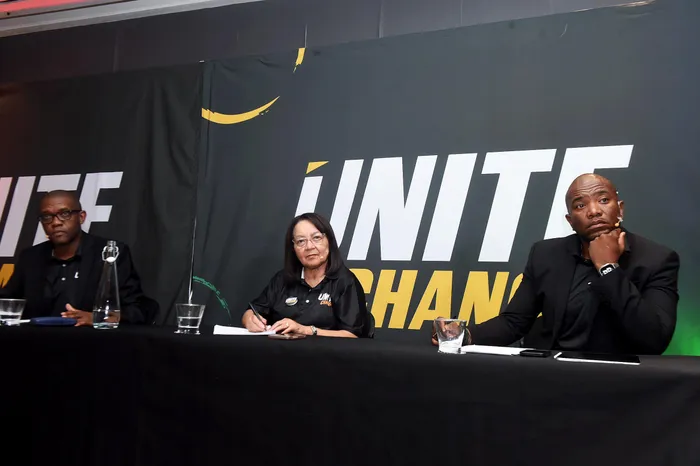Breaking Ideological Shackles Key to United for Change Survival

(FROM left) Rise Mzansi Leader Songezo Zibi, GOOD Party leader Patricia de Lille and leader of Build One South Africa (BOSA) Dr Mmusi Maimane, announced their new political party Unite for Change in Rosebank on October 05.
Image: Itumeleng English / Independent Newspapers
Zamikhaya Maseti
The unveiling of Unite for Change (UFC) by Patricia de Lille, Mmusi Maimane, and Songezo Zibi could mark a turning point in South Africa’s political landscape. This new formation may offer voters a long-term, credible alternative, one that transcends the entrenched partisan divides of the Post-Apartheid era.
Positioned as a centrist political movement, Unite for Change emphasises national renewal over narrow party interests. Its architects seek to rally South Africans behind a shared vision grounded in ethical leadership, economic recovery, service delivery, and justice.
The movement seeks to reshape the national conversation, away from ideological rigidity and factionalism, toward a pragmatic agenda for reconstruction. If successful, UFC could reconfigure the balance of forces within South Africa’s maturing democracy and introduce a viable middle ground to an otherwise polarised system.
Politics, like nature, is a ruthless ecosystem; there is no sanctuary for the weak. This analogy captures the current state of South African politics, an ecosystem of moral exhaustion and institutional decay.
Into this vacuum steps Unite for Change, seeking to occupy the moral and political space left open by failing incumbents and fatigued opposition Parties. The movement’s challenge is not only to present itself as new, but to inspire the disillusioned majority to believe once again that democracy can deliver.
The tragedy of the Post-1994 political evolution is that those entrusted with revolutionary transformation have abandoned the Post. Authority has eroded; moral clarity dimmed; conscience subdued by the sins of incumbency. Unite for Change has identified this void and now positions itself as the moral corrective, a civic force for renewal amid the ruins of betrayed promise.
The real test, however, lies in whether UFC can develop a compelling political proposition capable of engaging the undecided and disengaged voters. Its success will depend on its ability to penetrate the thick layers of political apathy that blanket the electorate. It must not only call for unity but also animate belief. For this, its moral and political pedigree will be crucial.
UFC must also define itself apart from the historical ANC splinters. It cannot be a recycled fragment of liberation politics, nor another sanctified echo of nostalgia. Its survival rests on projecting a new political grammar, one unburdened by the past and rooted in discipline, ethical conviction, and competence. This distinction will decide whether it emerges as a genuine alternative or fades into the ranks of noble but failed experiments.
Encouragingly, De Lille, Maimane, and Zibi do not draw on the tired symbols of liberation politics, the fist, spear, hammer, and sickle. They represent a clean slate, entering the arena without invoking the liberation heritage that has long served as moral currency over the years.
Yet, De Lille and Maimane carry political shadows that may follow them, reminders of experience but also of unfinished battles and perceived inconsistencies. Their challenge will be to convince the public that this time, they stand for something greater than political resurrection.
Songezo Zibi, relatively new in politics, embodies intellectual clarity and managerial discipline. Though his ascent into Parliament in 2024 remains fragile, he could serve as the adhesive that binds the movement’s diverse ambitions. His corporate experience may anchor UFC’s ethos of ethical governance and disciplined execution, qualities South African politics sorely needs.
The UFC’s national appeal will depend on whether it can articulate a coherent ideological vision that resonates beyond the urban middle class. Its centrist outlook must translate into tangible policies that address both working-class aspirations and middle-class frustrations. Bridging South Africa’s socio-economic divide, between those trapped in structural poverty and those alienated by elite corruption, requires moral authority and strategic political craft.
The movement must also avoid the perennial pitfall of South African start-ups: elite consensus without grassroots depth. Without an organic base among youth, workers, and community leaders, UFC risks becoming another boutique project of disaffected Professionals. A movement built in Boardrooms and Broadcast Studios cannot substitute for one anchored in the lived experiences of ordinary citizens.
Its durability will ultimately depend on whether South Africans come to see Unite for Change not merely as another Party, but as a moral awakening, a civic movement reclaiming democracy from the fatigue of liberation nostalgia and opposition theatrics. UFC’s emergence signals the country’s deep yearning for ethical renewal and institutional restoration after years of democratic erosion.
Should it succeed in fusing moral vision with the pragmatic demands of governance, it could become the new centre of gravity in South Africa’s evolving political spectrum, a force that neither romanticises the past nor panders to populist impatience. But should it falter, it will merely confirm that South African politics has become a cemetery of noble intentions, where each new experiment dies on the altar of expediency and ego.
The coming years will therefore test whether UFC can transcend rhetoric and symbolism to become a genuine vehicle of national renewal, or whether it too will be devoured by the unforgiving laws of the political jungle it seeks to navigate.
Like its spiritual counterpart across the border, the Umbrella for Democratic Change in Botswana under Duma Boko, UFC offers a metaphorical canopy against the storms of political decay and misgovernance.
Boko’s movement sought to shield citizens from nearly sixty years of unbroken rule by the Botswana Democratic Party, where democracy had become routine and governance ritual. Similarly, UFC seeks to shelter South Africans not merely from despair but beneath a canopy of renewed faith in democracy, leadership, and the collective future of the Republic.
* Zamikhaya Maseti is a Political Economy Analyst and holds a M.Phil in South African Politics and Political Economy from Nelson Mandela University.
** The views expressed do not necessarily reflect the views of IOL, Independent Media or The African.